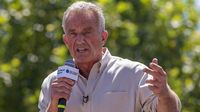In a significant shakeup at the Food and Drug Administration (FDA), Peter Marks, the director of the Center for Biologics Evaluation and Research (CBER), announced his resignation effective April 5, 2025. This decision follows a tumultuous period under the new Health and Human Services (HHS) Secretary Robert F. Kennedy Jr., who has been criticized for promoting misinformation regarding vaccines.
Marks, who has led CBER since 2016, has been a staunch advocate for vaccines and regulatory flexibility for gene therapies aimed at rare diseases. His departure has raised concerns among investors and industry experts, who fear that it signals a shift away from scientific rigor within the FDA, particularly in light of Kennedy's controversial views.
According to multiple reports, Marks was given the ultimatum to resign or face termination by an unnamed HHS official. In his resignation letter, Marks expressed his disappointment, stating, "It has become clear that truth and transparency are not desired by the Secretary, but rather he wishes subservient confirmation of his misinformation and lies.” This assertion highlights the growing tension between scientific integrity and political influence within the agency.
The fallout from Marks' resignation was immediate, with shares of several biotech companies plummeting on March 31, 2025. The S&P 500 biotech ETF dropped by 4.9%, with individual companies like Moderna and Novavax experiencing declines of 8.9% and 8.4%, respectively. Vaxcyte saw an even more dramatic fall, plummeting 45.6% following mixed results from a recent vaccine study.
Marks' exit is part of a broader trend of upheaval within the FDA, which has faced significant changes since Kennedy's confirmation in February. Alongside Marks, other notable departures include Patrizia Cavazzoni, who left her position as head of the FDA’s Center for Drug Evaluation and Research (CDER) in January to become Pfizer’s chief medical officer. Reports indicate that additional high-level officials, including deputy directors Paul Kluetz and Marc Theoret, are also considering resignations.
Industry leaders have expressed grave concerns regarding the implications of these changes. John Crowley, CEO of the Biotechnology Innovation Organization (BIO), stated, "We are deeply concerned that the loss of experienced leadership at the FDA will erode scientific standards and broadly impact the development of new, transformative therapies to fight diseases for the American people.”
Marks' resignation letter also addressed the ongoing measles outbreak affecting multiple states, a situation he attributed to the erosion of public confidence in vaccines. He noted, "What happens when confidence in well-established science underlying public health and well-being is undermined." This remark underscores the critical role that the FDA plays in maintaining public trust in health initiatives.
The market's reaction to Marks' resignation reflects a broader anxiety within the biotech sector. Analysts at William Blair noted that the departure of such a key figure could create a significant near-term overhang for smaller and midsized biotech companies, particularly those involved in vaccine and gene therapy development.
As the FDA grapples with these leadership changes, the appointment of a new CBER director will be pivotal. Marty Makary, a surgeon and health researcher from Johns Hopkins, has recently been confirmed as the new FDA commissioner. Analysts are hopeful that Makary will prioritize finding a successor who aligns with the FDA's commitment to scientific integrity.
Despite the uncertainty, some analysts have suggested that companies already working with the FDA on rare disease therapies may not face immediate regulatory risks. Jefferies analysts indicated that they had not detected any delays in the approval processes for these companies, suggesting that the existing programs may remain intact.
However, the concern remains that Kennedy's administration may push for a more politically aligned approach to vaccine regulation, which could further complicate the FDA's mission. The agency is currently under pressure to cut approximately 3,500 positions as part of a broader initiative to reduce the workforce across the Department of Health and Human Services.
As this situation continues to unfold, the biotech industry is left to navigate a landscape marked by uncertainty, political influence, and the potential for significant changes in regulatory practices. The coming weeks will likely be critical in determining the direction of the FDA and its impact on public health initiatives.
In summary, Peter Marks' resignation from the FDA has triggered a wave of concern across the biotech sector, highlighting the fraught intersection of science and politics in public health. As the industry grapples with the implications of this leadership change, the focus will be on how the FDA can maintain its commitment to scientific integrity amidst growing political pressures.







